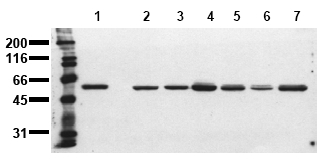SRC (N-term) (incl. pos. control) Mouse Monoclonal Antibody [Clone ID: 11F1]
CAT#: AM00146PU-N
SRC (N-term) (incl. pos. control) mouse monoclonal antibody, clone 11F1, Purified
Other products for "SRC"
Specifications
| Product Data | |
| Clone Name | 11F1 |
| Applications | ELISA, WB |
| Recommended Dilution | ELISA: Use at 0.05 µg/ml Immunoblotting: 0.5 µg/ml for HRPO/ECL detection. Recommended blocking buffer: Casein/Tween 20 based blocking and blot incubation buffer AS00002BU-N or AS00002BU-L. Included Positive Control: Cell lysate from untreated A431 cells (See Protocols for more details). |
| Reactivities | Canine, Human, Mouse, Rat |
| Host | Mouse |
| Isotype | IgG1 |
| Clonality | Monoclonal |
| Immunogen | synthetic peptide conjugated to KLH Epitope: N-terminus |
| Specificity | AM00146PU-N specifically recognizes the N-terminus of Src in Western blot at 60 kDa. |
| Formulation | 1ml 2 x PBS, containing 0.09% Sodium Azide/PEG and Sucrose. State: Purified State: Lyophilized purified Ig fraction. |
| Reconstitution Method | Restore with 1 ml H2O (15 min, RT). |
| Purification | Subsequent Subsequent Thiophilic and Size Exclusion Chromatography. |
| Conjugation | Unconjugated |
| Storage | For long-term storage, freeze lyophilizate upon arrival (-20°C). Upon reconstitution, aliquote and freeze in liquid nitrogen; reconstituted antibody can be stored frozen at -80°C up to 1 year. Avoid repeated freeze / thaw cycles. Thaw aliquots at 37°C. Thawed aliquots may be stored at 2-8°C up to 3 months. |
| Gene Name | SRC proto-oncogene, non-receptor tyrosine kinase |
| Database Link | |
| Background | Src is the best understood member of a family of 9 tyrosine kinases regulating cellular responses to extracellular stimuli. Src is activated by PDGF and other growth factors that activate transmembrane tyrosine kinase receptors as well as increased intracellular calcium or oxidative stress. Src becomes activated upon dephosphorylation of Tyr 527, leading to a conformational change of the src molecule towards an “open“, active conformation which allows binding to other proteins via the SH2 and SH3 domain. Activated src phosphorylates a variety of substrates involved in the mitogenic signalling pathway, cytoskeletal organization, cell-substrate adhesion, cell-cell adhesion, cell-cell communication, and RNA processing. |
| Synonyms | c-Src, pp60c-src |
| Note | Mol. weight: 60 kDa Protocol: Positive Control Provided. Cell lysate from untreated A431 cells Description: Cell lysate from untreated A431 cells, epidermoid carcinoma (Human) Format: Lyophilized cell lysate from serum starved A431 cells. Reconstitution:Restore by addition of 200 µl H20. After complete solubilization add 200 µl 2x SDS-PAGE sample buffer, mix and incubate at 90°C for 5 min. Storage: Aliquote and store frozen. Avoid repeated freeze/thaw cycles. Application: The positive control cell lysate is recommended for immunoblot applications. 20 µl of positive control cell lysate correspond to ca. 80.000 cells. Use 20 µl / lane (mini gel) for HRPO/ECL detection of the target proteins. Please note: The lyophilized cell lysates contain SDS and are not recommended for applications with native proteins such as immunoprecipitation. |
| Reference Data | |
| Protein Families | Druggable Genome, ES Cell Differentiation/IPS, Protein Kinase, Stem cell relevant signaling - JAK/STAT signaling pathway |
| Protein Pathways | Adherens junction, Endocytosis, Epithelial cell signaling in Helicobacter pylori infection, ErbB signaling pathway, Focal adhesion, Gap junction, GnRH signaling pathway, Tight junction, VEGF signaling pathway |
Documents
| Product Manuals |
| FAQs |
| SDS |
{0} Product Review(s)
0 Product Review(s)
Submit review
Be the first one to submit a review
Product Citations
*Delivery time may vary from web posted schedule. Occasional delays may occur due to unforeseen
complexities in the preparation of your product. International customers may expect an additional 1-2 weeks
in shipping.






























































































































































































































































 Germany
Germany
 Japan
Japan
 United Kingdom
United Kingdom
 China
China



